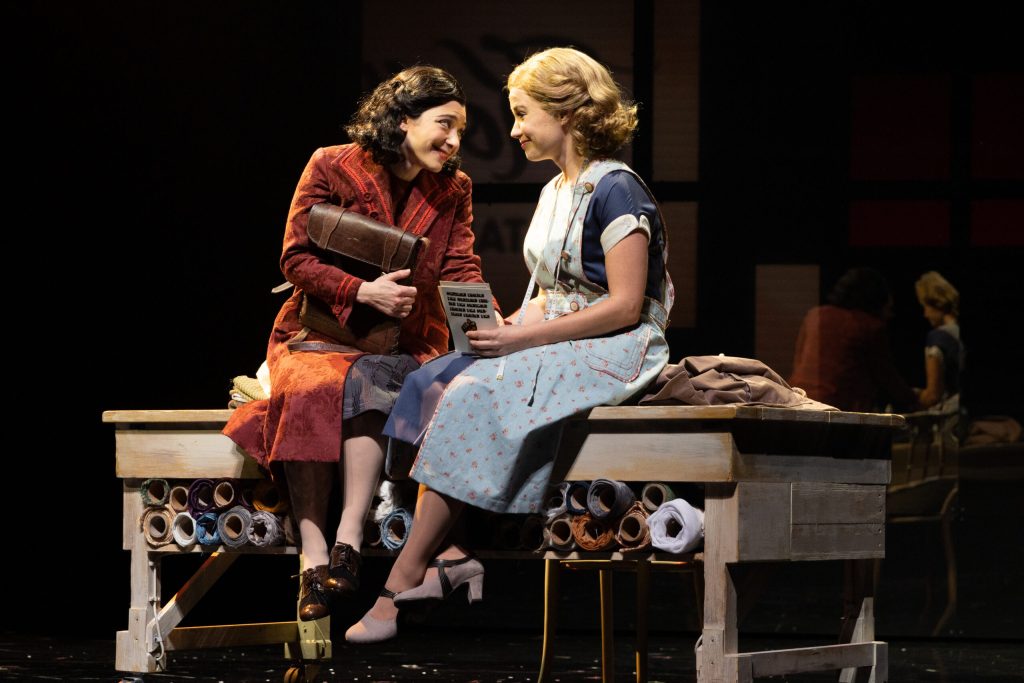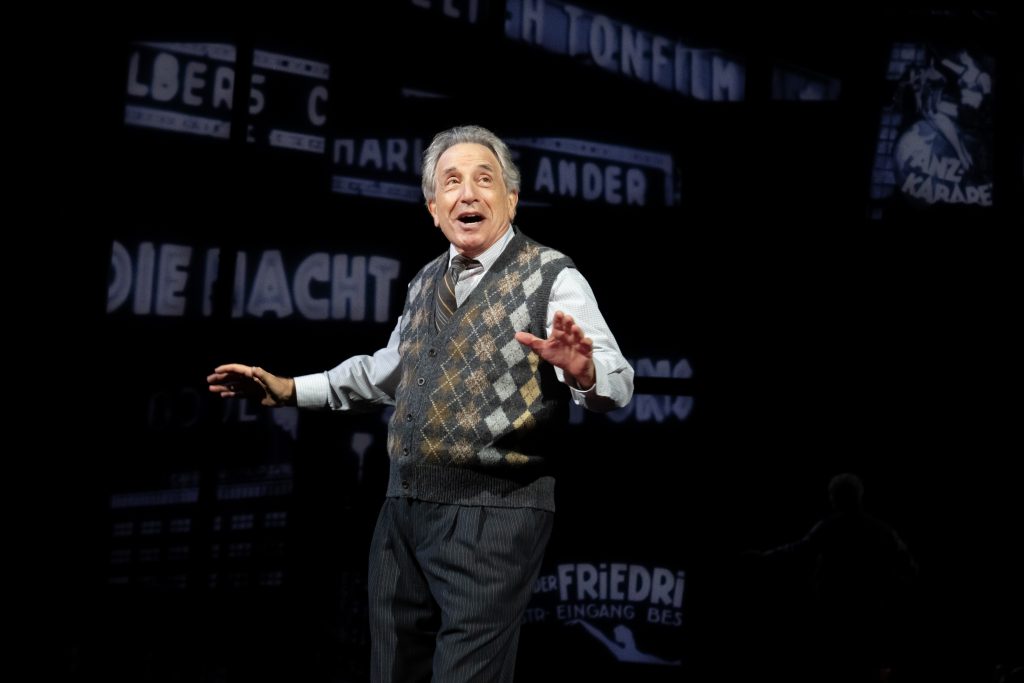After 25 years and productions in San Diego, Los Angeles, Atlanta and Off Broadway, Harmony finally opened at the Ethel Barrymore Theatre this week. The musical about an internationally famous, all-male, German “close harmony” ensemble that performed between 1928 and 1934, appears straightforward. Yet, Harmony‘s complex themes dislocate and unsettle because of their currency. With music by Barry Manilow, book and lyrics by Bruce Sussman, and direction and choreography by Warren Carlyle, Harmony is unforgettable.
Because of the talented cast whose vocal skills and energy resound with power, the production succeeds despite its flawed book. Importantly, we gain another perspective about a distant time period that holds seminal lessons for us today.
We learn about the Comedian Harmonists through the Rabbi, a former member
Primarily, we learn the history of the Comedian Harmonists through the storytelling Rabbi (the exuberant and mesmerizing Chip Zien). Now in his senior years, he reflects on his pivotal role in the ensemble’s lightning success. As he resurrects memories from the time they first came together to make close harmonies, he shares his joy, regrets and wisdom. Meeting the members of the ensemble, three of whom are Jewish, we learn about their rapid rise to international fame.
The gobsmacking ensemble includes Bobby (Sean Bell), Young Rabbi (Danny Kornfeld), Harry (Zal Owen), Erich (Eric Peters), Chopin (Blake Roman), and Lesh (Steven Telsey). We also meet Mary (Sierra Boggess), the Rabbi’s wife, who converts to Judaism. Additionally, the Protestant Chopin marries Jewish communist/activist Ruth (Julie Benko). So in Act II the wives encounter the hell of being in a mixed marriage (“Where You Go”). Boggess and Benko do a heartfelt, beautifully rendered duet that symbolizes the tragedy of what couples experienced then and now when discrimination flourishes.
Creating a spiritual and emotional harmony
Blind to religious differences, the group’s enjoyment of singing and artistic expression creates strong soul ties. These bonds ground the ensemble and help foster their superlative, one-of-a-kind music that appeals throughout the world.
Stepping back into time, the opening number, performed at Carnegie Hall (1933), presents them at the pinnacle of their success. The incredible performers, Barry Manilow and John O’Neill’s vocal arrangements, and Doug Walter’s superb musical arrangements convey the magnificence of the group’s nonpareil talent. Then, to coalesce their identity and the musical’s overarching theme, they sing the titular “Harmony.” Within his joyful reverie, Zien’s Rabbi connects the dots through flashbacks in their amazing and poignant time together.
As we delight in past vignettes, we understand how their flame burns with inextinguishable brilliance. With “This Is Our Time,” “Your Son Is Becoming a Singer,” and “How Can I Serve You Madame,” the group’s energy and madcap humor propel them to creative heights. And their personal lives flourish. The Rabbi professes his love to Mary in the lovely “Every Single Day.” However, their wedding celebration is marred by a thug who smashes in a window of the synagogue. Importantly, that action foreshadows Kristallnacht (1938) in Germany and Austria.
Darkness descends on Germany
During their fantastic tour abroad, darkness descends on Germany (“Tour of the World”). Amongst the German populace, divisions worsen. Ruth protests against the Nazis who beat her and the other marching Bolsheviks. However, in a letter she tells Chopin they remain hopeful. Ultimately, the Nazis will lose, she posits.
Because the votes split among various German political parties, Hitler wins. Of course, this turning point presages the Nazi reign of terror. Nazism’s hatreds divide the German people irreconcilably. Through Goebbels, Hitler distorts truth, beauty, enlightenment and peace with lies and propaganda. As such the Party destroys everything and everyone it touches. At the end of Act I, the chilling Nazi flag, symbol of hatred, unfurls center stage.

Divisions among ensemble members symbolize divisions in Germany
Sussman’s book emphasizes these divisions and distortions through the ensemble’s growing disagreements. Especially between and among the couples, the strains intensify. But hindsight is 20-20. Do they believe Ruth, or follow their intuition that the Nazis and Hitler mean what they say? Like many who lived at that time, the beloved ensemble did not want to confront issues portending life or death.
Ultimately, two paths clarify on what they should do, with ensemble members and wives on either side. Should they allow the Nazis to end the group’s celebrity, monetary success and happiness together, silencing their art and destroying their soul bonds? Should they split up to stay safe, with one group performing in Germany? Or do they all stay together and immigrate, as Albert Einstein suggests when he visits them after their fabulous performance in the U.S.?
Einstein (portrayed in characteristic wig by Zien, who plays all the older parts), raises points that terrify. He insists the old Germany they knew may not exist anymore. Then, he adds, “The world will not be destroyed by those who do evil, but by those who watch them and do nothing.” In particular these words haunt Zien’s Rabbi because of the mistakes he makes with his inaction and disaffection, not even keeping up on what’s happening in Germany with Hitler’s rise.
Should I stay or should I go?
As they wrangle about what course to take, their discussion with Einstein emphasizes the dilemma and problems of immigration. In the powerful “Home” they sing that going back holds the most promise. Sean Bell’s Bobby powerfully insists they return to Germany which recognized and appreciated their work. On the other hand, NBC affords them an opportunity to sell their records and help them with their growing film careers in Hollywood. For good or ill, they decide to stay together as an ensemble. Together, they flourish. Their success together gave them world-wide recognition. Surely, Germany cannot stand in their way. They are celebrities.

In “Threnody” Zien’s Rabbi pulls out all the stops, singing from his perspective decades later. He sings his regrets at not stopping their return to Germany. If he had convinced Bobby to stay in the United States and apply for citizenship, in a free country, nothing could stop their continued success. After all, in 1933 no problem existed between Germany and the U.S.
At the beginning of Act II, the fantasy of their moving to New York City plays out in “We’re Goin’ Loco!” But the jazzy number that the ensemble and Josephine Baker (Allison Semmes) perform is a dream that Zien’s Rabbi cuts short. Conflicted, afraid, they go back to Germany and into the jaws of hell.
When they return, the net closes around them as they perform. Various Nazi officials first give them allowances and even protect them. However, this occurs only for a season. They have their passports revoked and their bank accounts monitored because of their Jewish members. If they stay, the cage will close them in until they are dead. Once again, their circumstances infer how Hitler’s criminal gang “justifiably” stole from their Jewish “enemies” and killed them to fund the Third Reich’s glory. Finally, their act is banned and they can’t perform because the Reich considers them degenerates.
Act II relies too much on the Rabbi’s direct address to the audience
At the conclusion, Act II perhaps relies too much on the Rabbi’s direct address to the audience, as he explains what happens to the ensemble. Sussman’s book does show a vignette of how the director kicks them off a movie set (“In This World”), when Chopin is too upset to play the role. In the next sequence, they are on the night train to Munich to perform one last time. The Rabbi discovers Hitler is on the same train. Singing from hindsight, he spills his grief to the audience. Though he would have been punished, he regrets not assassinating Hitler. He believes his sacrifice would have saved millions.
In “Threnody” the Rabbi bludgeons himself with guilt at having done nothing to prevent evil and killing Hitler. As he echoes Einstein’s comments, we are reminded of the cost of doing nothing. But to save lives, the Rabbi, a religious man, would have had to kill. It is a dilemma with no viable choice. Most probably many in the audience can identify with the Rabbi’s decision, however painful. Zien is just terrific in the role. He conveys the uncertainty and fear of making the wrong decision, which is inevitable when death is at the end of every choice.
In chronicling the Comedian Harmonists’ story, the show emphasizes obvious lessons of the Holocaust (“Why?”). Why did he and the rest of the ensemble allow external discrimination and bigotry to divide them for the rest of their lives? Why did they sink into cowardice and destroy their talents and bonds? Why didn’t they do more to stop Hitler and stand up against the Nazis? Unable to recoup, overwhelmed with the stress and impact of Hitler’s growing empire on their lives and values, the beauty and artistry they created together dies.
“Stars in the Night”: A hopeful ending
“Stars in the Night,” which they sing during their last performance and the Rabbi recalls, ends with hope. They never sang together again. However, they did survive WW II, perhaps carried by the glories of what once was. And their story and music live once more, made known to the world in Harmony.
Through Beowulf Boritt’s suggestive, easy and seamless set design, Linda Cho and Ricky Lurie’s period costumes, and Tom Watson’s wig and hair design, the lives of the characters are carved out of that time period so we can relate. Kudos to the rest of the creative team for their fine efforts to enliven a story that reminds us of the cost of cowardice when despots silence all voices except their own. As poignant as Harmony is, the musical strikes a chord for our time. It encourages us with hope to follow the Rabbi’s and Einstein’s exhortations.
For tickets to Harmony go to the Ethel Barrymore Theatre on West 47 St. or the website.
 Blogcritics The critical lens on today's culture & entertainment
Blogcritics The critical lens on today's culture & entertainment




